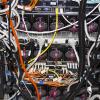In 2011, at the Techonomy conference in California, Google Executive Chairman Eric Schmidt made a bold statement. “Every two days now we create as much information as we did from the dawn of civilization up until 2003. That’s something like five exabytes of data, he says. Let me repeat that,” he said. “We create as much information in two days now as we did from the dawn of man through 2003.”
Recent posts
For today's Digest we will highlight a new search engine that will help federal and state agencies improve their ability to provide data to citizens, a look at a new bill that would expand the investment in public-private manufacturing partnerships, the importance of orientation for students enrolled in online courses, the addition of a 3D printer to the Cincinnati public library, and a look at some of the roadblocks that need to be overcome to build an exascale supercomputer.
Today we will take a look of the state of school diversity 60 years after Brown v Board of Education, a new study that is raising concerns about how fair classroom observations are, a look at the job market for this years graduating college students, a school libraries unique move to provide 3D printers, and a discussion of how to resolve the issue of high cost college textbooks.
Today we look at a new supercomputer system being built that will help in big data research, the expansion of dual credit STEM programs at high schools, New York's largescale effort to expand its online course offerings through its SUNY schools, and a new study that is offering insights into just how well students retain information learned from MOOC's.
The Digest for today will take a look at some of the applications being developed at college campuses that rely on the Internet of Things, a new set of performance ratings for the Ohio schools involved in the data scrubbing scandal, a new open data law that will improve government accountability, a major investment into creating a public cloud in Massachusetts, and robots at the Chicago Public Library.
Today's Digest takes a look at a new grant program in Utah aimed at improving STEM education, the forecasted increase in federal spending on big data related expenses, a bold move from the state of Wyoming in rejecting to use a new set of sceicne standards that have been developed for K-12, a look at why many manufacturing firms should and are considering moving factories back to the U.S., and a proposal from the universities in Ireland to create a unified brand for selling online courses.
Astronomical objects in the space beyond the earth are fascinating and enigmatic. We belong to the planetary system of our home star, the Sun, which is our source of energy on Earth. The Sun is a gigantic ball of hot plasma, the fourth and most prevalent state of matter (over 99% of matter in the universe is plasma, not solid, liquid or gas). It is very important to know how the Sun generates its energy, how that propagates as radiation, what are the solar constituents and elemental abundances, and what are the plasma conditions throughout the Sun.
Today we will look at a unique teacher apprenticeship program that is helping mid-career professionals become teachers, a new report that will provide guildelines to help schools improve the efficiency of their spending, the school levy results from Tuesday's primary election, new funding from the Board of Regents to develop workforce training programs, and efforts from some of Ohio's school districts to expand their vocational education offerings.
The Digest for today looks at the increasing amount of time students spend taking and preparing for standardized tests, a series of new online courses to be taught by the Smithsonian Institute, a new supercomputer that will be owned and operated by a collaboration of colleges and private companies, Google's pledge to stop scanning student emails for advertising purposes, and an open letter from renewable energy companies discussing their impact on the state's economy.
There are several reasons why an organization choses to move forward with using virtual machines. The driving force in the decision process for many organizations is money – or more specifically – the expected savings of money. Unfortunately, if this is the sole decision point for using virtual machines, organizations will lose out on the benefits of virtual machines and probably not save any money in the process.
- ‹ previous
- 34 of 54
- next ›







